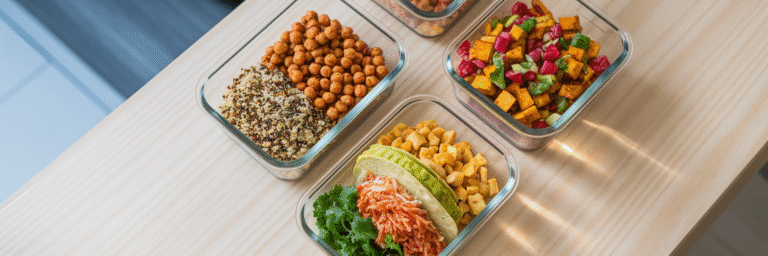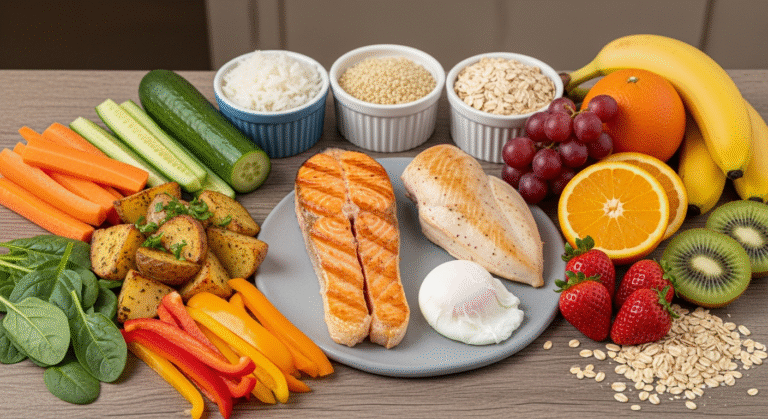50 Bite-Sized Resolutions For Better Health: Small Changes, Big Impact
When it comes to improving our health, big goals can feel overwhelming. Instead of trying to change everything at once, small and simple steps can make a real difference over time.
By choosing bite-sized resolutions, we can build better habits that stick without feeling stressed or pressured.
We’ve put together 50 easy-to-follow ideas that fit into everyday life. These aren’t about quick fixes but about making steady progress, whether it’s eating a bit healthier, moving more, or taking care of our mental well-being.
Each resolution is designed to be doable, so we can pick a few that work best for us and make lasting changes.
Why Bite-Sized Resolutions Work
Small changes fit easily into our day. They help us build new habits step by step, stop us from feeling worn out, and give us quick reasons to feel proud.
These things make it easier to stick with our goals and keep us moving in the right direction.
Building Consistency With Small Habits
When we pick tiny goals, it’s easier to add them to our routine. Doing something small every day, like drinking more water or walking for 5 minutes, slowly turns into a habit without much effort.
Consistency is key because it trains our brain. The more we repeat a small action, the more natural it feels.
Over time, these tiny efforts add up and can lead to bigger changes. We don’t need to make huge shifts all at once.
Starting small prevents us from feeling overwhelmed or discouraged. A little habit each day is better than trying to do too much and giving up.
Reducing Overwhelm and Burnout
Big resolutions can feel like a mountain to climb. We might start strong but tire out quickly or get stressed.
Small goals break this pattern by focusing on easy wins. By not pushing ourselves too hard, we avoid feeling burnt out.
We stay motivated because our efforts aren’t draining. This means we’re more likely to keep going even when life gets busy or hard.
When we set realistic goals, it’s easier to stay in control. We don’t distract ourselves with too many big changes at once.
This way, our health journey feels manageable instead of stressful.
Enjoying Quick Wins
Small victories give us fast rewards. When we hit a little goal, like swapping a large dinner plate for a smaller one, we see results quickly — maybe eating less without noticing.
These quick wins boost our confidence. They remind us that change is possible and encourage us to try more.
Each success builds a positive cycle, where feeling good leads to more healthy choices.
Celebrating these small steps also keeps us excited. It’s satisfying to know we’re making progress, no matter how small, instead of waiting months for a big payoff.
Daily Nutrition Tweaks
Small changes to how we eat every day can make a big difference in our health. These tweaks are simple but smart ways to control portions, shop smarter, cook at home, and cut back on unhealthy snacks.
Let’s look at practical steps we can take now.
Switching To Smaller Plates
Using smaller plates helps us eat less without feeling deprived. When our plates are big, we tend to fill them up and finish everything, even if it’s too much food.
Smaller plates make portions look bigger, which tricks our brain into feeling satisfied with less. Try swapping your large dinner plates for smaller salad plates at mealtimes.
This can reduce calorie intake without drastic changes to what we eat. Over time, this habit helps control portion sizes easily.
Prepping Healthy Grocery Lists
Making a grocery list before shopping keeps us on track and stops impulse buys. Spending just 15 minutes planning what we need helps us focus on nutritious foods and avoid walking the aisles hungry, which can lead to buying junk food.
We can keep lists on our phones to check while shopping or jot them down quickly before heading out. Writing down healthy staples like veggies, lean proteins, and whole grains makes healthier meals easier to cook.
Cooking More At Home
Cooking at home lets us control ingredients and portion sizes. Making meals from scratch often means less sugar, salt, and unhealthy fats compared to eating out or buying ready-made meals.
It also lets us try new recipes and improve our cooking skills. Preparing double batches and freezing portions saves time on busy days and keeps us from ordering fast food.
Even roasting vegetables instead of boiling adds more flavor and nutrients.
Recipe Card: Roasted Brussels Sprouts
- Prep time: 20 minutes
- Nutritional info: Low calorie, high fiber, vitamin C rich
- Tools: Baking sheet, oven
- Ingredients:
- 1 lb Brussels sprouts (450 g), halved
- 2 tbsp olive oil (30 ml)
- Salt and pepper to taste
- Instructions:
- Preheat oven to 400°F (200°C).
- Toss Brussels sprouts with olive oil, salt, and pepper.
- Spread on baking sheet and roast 15-20 minutes until crispy.
Limiting Packaged Snacks
Cutting back on packaged snacks reduces added sugars, unhealthy fats, and empty calories. These snacks often cause overeating because they don’t satisfy hunger well.
Instead, avoid the packaged snack aisle when grocery shopping. If we want snacks, choosing fresh fruits, nuts, or making homemade treats can keep us healthier.
Baking our own cookies means we control the ingredients and portion size. Focusing on simple, natural snacks helps us avoid cravings and maintain energy without guilt.
Meal Planning and Smart Eating Swaps
Planning meals ahead can save us time and cut down on last-minute unhealthy choices. Small changes in how we prepare and swap foods can make a big difference for our health without making us feel overwhelmed or hungry.
Check out our low calorie high protein meal prep ideas or our vegan meal prep recipes.
Meal Prepping On Sundays
Setting aside time on Sundays to plan and prep meals helps us eat healthier all week long. Writing a grocery list based on planned meals keeps us focused and prevents impulse buys.
Cooking double batches of dinners means we have ready meals when we’re tired or busy. We can chop veggies, cook grains, or portion out snacks in advance.
Storing meals in individual containers makes grabbing lunch or dinner quick and easy. This also reduces food waste by using leftovers creatively.
Tips for successful meal prepping:
- Pick simple recipes with few ingredients
- Use versatile ingredients across meals
- Label and date containers for easy rotation
Experimenting With Meatless Days
Trying meatless days, like Meatless Mondays, is a simple way to add more vegetables and fiber to our diet. It creates space for plant-based proteins such as beans, lentils, or tofu.
This can help lower saturated fat without feeling deprived. Starting with one meatless day a week lets us experiment with recipes and find favorites.
Over time, we may naturally add more meat-free meals. Cooking creative dishes like veggie stir-fries or chickpea salads can keep meals exciting.
Plant-based protein ideas:
- Black bean chili
- Lentil soup
- Veggie-packed pasta dishes
Roasting Instead Of Boiling Veggies
Roasting vegetables instead of boiling them brings out more flavor and texture. It’s a simple way to turn basic veggies into a tasty side dish we actually want to eat.
Roasted Brussels sprouts, carrots, or cauliflower develop a caramelized sweetness that boiling won’t give. Roasting uses less water, which helps keep more nutrients intact.
We just need a baking sheet, a bit of oil, and about 20 to 30 minutes in the oven. Tossing veggies with herbs or spices before roasting adds extra flavor without extra calories.
Roasting basics:
- Preheat oven to 425°F (220°C)
- Cut veggies into even pieces
- Drizzle with olive oil and season
- Spread in one layer for even cooking
Simple Fitness Habits For Everyday
Small and easy movements can make a big difference in how we feel day to day. Fitting mini workouts into our routine, choosing stairs over elevators, and mixing exercise with social time keep us active without much hassle.
These simple habits help us move more without needing a gym or extra gear (though we found some great leg workout machines for home here)
Desk Workouts And Micro-Movements
Sitting for long periods can slow us down, so we need quick moves to wake up our bodies. Every hour, setting a timer to do 30 seconds to 1 minute of exercises like squats, push-ups, or lunges helps us stay active.
These exercises don’t need equipment and can be done right by our desks. Stretching our arms, doing tricep dips on a chair, or even standing up and walking in place can reduce stiffness.
These small bursts of activity add up, boosting our energy and focus throughout the workday. Staying consistent is key, so keeping reminders on our phone or computer works well.
Taking The Stairs
When we see stairs, skipping the elevator is a simple way to add exercise. Climbing stairs works our legs and gets our heart rate up in just a few minutes.
If the building has six flights or fewer, taking the stairs is usually doable and good for us. We don’t have to rush; even a slow pace brings benefits.
Carrying a light bag is okay, but heavy loads might be tough. Making this a habit saves time and helps burn some extra calories each day.
Pretending elevators don’t exist for short trips keeps us moving without thinking.
Active Social Plans
Blending social time with activity is a great way to stay fit without feeling like a workout. Instead of sitting down for a long coffee, why not suggest a walk together?
We can plan a standing exercise date once a week with a friend who won’t back out. Adding an active outing to every social event, like biking or a short hike, makes moving fun and part of our hangouts.
These moments keep us connected and healthy at the same time. It’s easier to stay motivated when we share goals and enjoy movement with others.
Mental Health In Easy Steps
Taking care of our mental health doesn’t have to feel overwhelming. Small actions can make a big difference when we focus on ourselves, take short moments to be mindful, and stay connected with people who matter.
These simple habits help reduce stress and boost our mood without major life changes.
Prioritizing Self-Care Moments
Self-care is not just a luxury; it’s a necessary part of keeping our minds balanced. We can start by setting aside a few minutes each day for activities that recharge us, like reading, taking a warm bath, or simply sitting quietly.
It’s important to listen to what we need. If we feel tired or stressed, choosing to rest or do something enjoyable is a good way to support our mental well-being.
Scheduling self-care time like an appointment helps us remember to make it a priority instead of an afterthought. Small changes, like cutting back on alcohol during the week or avoiding negative news before bed, can also improve how we feel.
These moments give us space to reset and build better habits over time.
Short Daily Mindfulness
Mindfulness means paying attention to the present without judgment. We don’t need long meditation sessions to do this.
Even just 2 to 5 minutes of deep breathing or focusing on our senses can help calm the mind. For example, a quick breathing exercise could look like this: breathe in slowly for 4 seconds, hold for 4 seconds, and breathe out for 6 seconds.
Doing this daily can reduce stress and bring a sense of calm when life gets busy. We also can try mindful eating by noticing the taste and texture of each bite or take a short walk outdoors paying attention to sounds and colors.
These little moments help us stay grounded and improve our emotional balance.
Connecting With Friends And Family
Social connections are key to good mental health. Spending time with trusted friends or family members helps us feel supported and less alone.
If in-person visits aren’t possible, phone calls or video chats work just fine. We can set a weekly time to catch up, even if it’s just a quick 10-minute conversation.
Being open about how we feel encourages others to share too, making our relationships stronger and more meaningful. Simple actions like sending a thoughtful message or inviting someone for coffee build bonds and remind us we matter to others.
Keeping these ties alive helps reduce feelings of stress and supports emotional well-being.
Lifestyle Upgrades You Can Stick To
Small changes in our daily routines can make a big difference in how we feel and stay healthy. It’s about making simple swaps and setting limits that help us live better without feeling overwhelmed or stressed.
Cutting Back On Sugary Drinks
Sugary drinks add a lot of empty calories and can cause energy crashes. Instead of reaching for soda or fancy coffee drinks all the time, we can cut back gradually.
Try swapping one sugary drink a day with water, herbal tea, or flavored water with slices of lemon or cucumber. This helps reduce sugar intake without feeling deprived.
If you like coffee, limit fancy coffee drinks to twice a week. They often contain hidden sugar and extra fat.
We can also keep track of how often we drink sugary beverages and set a weekly goal for fewer cups. This makes the goal clear and easier to follow.
Setting Social Media Boundaries
Social media can take up more time than we realize and sometimes cause stress. Setting limits on daily use can help us focus on other healthy habits.
Try setting a timer to use social media just 30 minutes a day. We can also choose no-phone zones, like during meals or an hour before bed, to improve sleep quality.
Turning off non-important notifications keeps us from constantly checking our phones. Unplugging one full day each week gives our minds a break and helps us connect more with people around us.
Making Home Healthier
Our home environment shapes our health in many ways. Making small changes can create a space that supports better habits.
Start by swapping harsh chemical cleaners for safer, more natural options like vinegar or baking soda. This reduces exposure to toxins.
Setting up a small workout corner with a mat and light weights encourages regular exercise. Having healthy snacks like nuts and fruit visible can help us avoid junk food.
Decluttering one area a week not only clears space but reduces stress. This makes our homes more inviting and calming.
What are some quick health goals I can set for myself?
Start by swapping large plates for smaller ones to eat less without feeling deprived. Making fast food off-limits near your home can also cut down on unhealthy meals easily.
Spending just 15 minutes a week planning your grocery list helps us shop smarter and avoid impulse buys. Trying meatless days once a week adds more veggies to our diet without much hassle.
How do I start making healthier food choices?
Planning meals ahead on Sundays saves us from last-minute decisions. Roasting veggies instead of boiling can make them tastier and more inviting.
Avoid the packaged snack aisle and bake your own sweet treats. Homemade desserts usually have less sugar and we tend to eat less when we make them ourselves.
What’s a simple exercise routine I can do daily?
We can do short bursts of bodyweight exercises like push-ups, squats, or planks for a minute each hour while working. A quick set keeps us moving without needing a full workout.
Setting one standing exercise date with a friend per week creates accountability. Trying new workouts at home with light dumbbells or a jump rope adds variety and keeps things fun.
Any tips for staying hydrated throughout the day?
Getting a pretty water bottle and keeping it nearby makes drinking water easier. Setting a timer every couple of hours is a useful reminder to refill and drink.
Tracking water intake daily helps us see if we need more. Adding fruit slices like lemon or cucumber can make water more interesting.
How can I improve my sleep habits for better health?
Turning the alarm clock away reduces anxiety about time and helps relax us before sleep. Reading a book or writing in a journal instead of using screens calms the mind.
Creating a consistent bedtime routine makes falling asleep easier. Avoid caffeine or heavy meals late in the day to help our bodies wind down.
What are baby steps I can take towards reducing stress?
Unplugging from screens one day a week lets us reset and focus on time with family or hobbies.
Taking a few minutes to write down things we love about ourselves builds a positive mindset.
Scheduling weekly catch-ups with friends or family supports emotional well-being.
Even small acts like giving daily compliments can improve our mood and connections.







